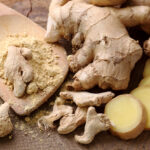Pungent spice shows great promise in fight against cancer
 (NaturalHealth365) Ginger is a spice with a pungent taste that is widely used in Asian and Indian cuisine. It is also used to add flavor to sweets and brewed in various drinks like tea.
(NaturalHealth365) Ginger is a spice with a pungent taste that is widely used in Asian and Indian cuisine. It is also used to add flavor to sweets and brewed in various drinks like tea.
Apart from its culinary uses, ginger is known for its medicinal benefits in many cultures. It can help alleviate nausea, digestive problems, and even pain. Ginger belongs to the same family as turmeric and cardamom, and all three are valued for their unique qualities.
Recent research has revealed that ginger has some exciting properties that may assist in preventing cancer. Surprisingly, this flavorful spice appears to induce harmful cancer cells to self-destruct.
Ginger found effective against a wide range of cancer types
Several recent studies have provided evidence supporting the anti-cancer properties of ginger extract. These studies have shown that ginger extract has anti-metastatic properties, which can inhibit various types of cancer, such as breast, colon, rectal, liver, lung, prostate, pancreatic, and melanoma.
The anticancer effects of ginger are attributed to its ability to activate specific molecular mechanisms that lead to apoptosis, or cell suicide, in cancer cells. This happens through the activation of a pro-apoptosis gene that stimulates the cells to undergo programmed cell death, a process that is essential to prevent the spread of cancer cells.
Furthermore, compounds present in ginger have been found to regulate the expression of genes and proteins that are associated with cancer while promoting the expression of genes that have cancer-inhibiting properties. These compounds have been shown to decrease the growth and proliferation of cancer cells while promoting healthy cell growth.
Strong potential to replace chemotherapy and radiation as cancer treatments
A study by the Biological Sciences Department of King Abdulaziz University in Saudi Arabia found ginger extract inhibited the growth of breast cancer cells while preserving normal cells. This process is known as selective cytotoxicity, has no side effects like chemotherapy and radiation, and has the potential to replace these drugs.
A University of Minnesota study from the Hormel Institute also confirms ginger can help prevent cancer. Researchers fed animals with colorectal cancer with gingerol three times a week. Those animals that received the gingerol had more than 75 percent fewer tumors and smaller tumor sizes than animals not receiving the ginger treatment.
Another study by Dr. Rebecca Lui and the University of Michigan presented at the 97th Annual American Association for Cancer meeting showed gingerols caused ovarian cancer cells to commit suicide.
Cancer cells die in the presence of ginger
A Georgia State University study showed that ginger extract helped shrink prostate tumors by over 55 percent in animals with prostate cancer. Around 20 other studies show similar conclusions regarding the anticancer properties of ginger. In short, ginger seems to prevent cancer by causing cancer cells to commit suicide.
Ginger also effectively reduces inflammation – a known breeding environment for cancer cells – and helps to supply health-supporting antioxidants within the body. Ginger has antiviral and antimicrobial properties and is highly concentrated, which means only small amounts are needed to reap healing benefits.
Global spice brings flavor and health benefits to the table
Thanks to ginger root’s versatility, it that can be consumed in various forms, including fresh, dried, powdered, or as oil or juice. Its pleasant aroma and distinct flavor make it a popular ingredient in many cuisines worldwide.
While India, Indonesia, Fiji, Australia, and Jamaica are the top producers of ginger root, its widespread availability allows it to be incorporated into dishes and remedies worldwide. Whether used to add flavor to a meal or as a natural remedy for digestive issues or inflammation, ginger root is a flavorful and beneficial addition to any diet.
To learn more about how to stop cancer naturally … own the Stop Cancer Docu-Class, created by Jonathan Landsman.
Sources for this article include:











